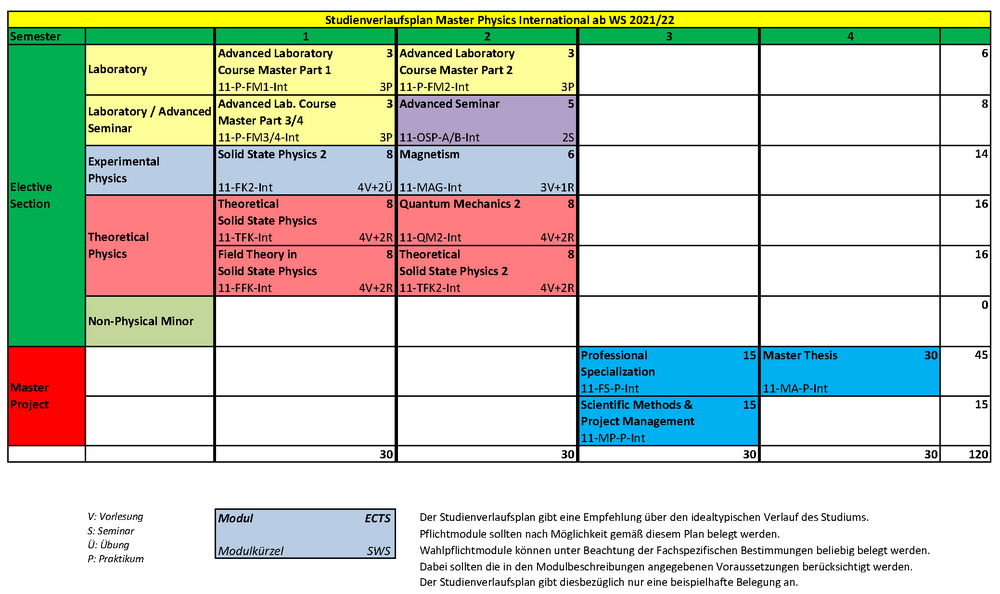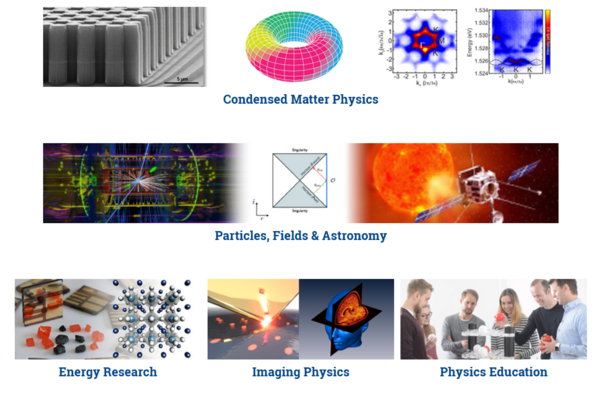Physics International
At a glace
Study Programme
| Target degree: | Master of Science (M.Sc.) |
| Standard lenghts of programme: | 4 Semester |
| Teaching language: | English |
| Start of study: | for the summer and winter semester |
Admission/Application
| Restricted Admission: | non, demonstration of proficiency in the relevant field required | ||||
| Aptitude Assessment: | see website Student Affairs |
Programme Content
Physics International can be studied in Würzburg as an consecutive Master's programme. The programme is offered entirely in English and is aimed at both international and German students.
With a focus on basic research, students receive a broad-based scientific education that includes experimental physics, practical courses, theoretical physics, mathematics and an individual specialisation.
The "Master of Science" programme prepares students for scientific activities in the field of physics and the "Master of Science" degree also prepares students for a doctorate (Dr. rer. nat.).
Learning Objectives
The aim of the programme is to provide students with in-depth knowledge of the mathematical and theoretical foundations of physics and interdisciplinary contexts as well as sound knowledge of the theoretical and experimental methods for gaining new insights, including the necessary ability to abstract, analytical thinking, a high level of problem-solving skills and the ability to structure complex contexts, so that they can work successfully as a responsible physicist in interdisciplinary and international teams of (natural) scientists and/or engineers in research, industry and business.
| Module Groups | Abbreviation | ECTS-Points |
|---|---|---|
| Electives Field | 60 | |
| Subfield Physics | mind. 55 | |
| Advanced Laboratory Course | mind. 9 | |
| Advanced Laboratory Course Master Part 1 | 11-P-FM1-Int | 3 |
| Advanced Laboratory Course Master Part 2 | 11-P-FM2-Int | 3 |
| Advanced Laboratory Course Master Part 3 | 11-P-FM3-Int | 3 |
| Advanced Laboratory Course Master Part 4 | 11-P-FM4-Int | 3 |
| Advanced Seminar | mind. 5 | |
| Advanced Seminar Physics A | 11-OSP-A-Int | 5 |
| Advanced Seminar Physics B | 11-OSP-B-Int | 5 |
| Experimental Physics | mind. 10 | |
| Image and Signal Processing in Physics | 11-BSV-Int | 6 |
| Organic Semiconductors | 11-OHL-Int | 6 |
| Physics of Advanced Materials | 11-PMM-Int | 6 |
| Spintronics | 11-SPI-Int | 6 |
| Solid State Physics 2 | 11-FK2-Int | 8 |
| Solid State Spectrocopy | 11-FKS-Int | 6 |
| Magnetism | 11-MAG-Int | 6 |
| Optical Properties of Semiconductor Nanostructures | 11-HNS-Int | 6 |
| Semiconductor Physics | 11-HPH-Int | 6 |
| Quantum Transport | 11-QTR-Int | 6 |
| Nano-Optics | 11-NOP-Int | 6 |
| Phenomenology and Theory of Superconductivity | 11-PTS-Int | 6 |
| Ultrafast spectroscopy and quantumcontrol | 08-PCM4 | 5 |
| Advanced Topics in Solid State Physics | 11-CSFM-Int | 6 |
| Methods of Observational Astronomy | 11-ASM-Int | 6 |
| Experimental Particle Physics | 11-TPE-Int | 6 |
| Introduction to Space Physics | 11-ASP-Int | 6 |
| Multi-wavelength Astronomy | 11-MAS-Int | 6 |
| Advanced Topics in Astrophysics | 11-CSAM-Int | 6 |
| Advanced Magnetic Resonance Imaging | 11-MRI-Int | 6 |
| For further modules, please refer to the relevant degree Subject Description (SFB) | ||
| Theoretical Physics | mind. 10 | |
| Quantum Mechanics II | 11-QM2-Int | 8 |
| Theoretical Quantum Optics | 11-TQO-Int | 8 |
| Theory of Relativity | 11-RTT-Int | 6 |
| Renormalization Group Methods in Field Theory | 11-RMFT-Int | 8 |
| Physics of Complex Systems | 11-PKS-Int | 6 |
| Advanced Theory of Quantum Computing and Quantum Information | 11-QIC-Int | 6 |
| Theoretical Solid State Physics | 11-TFK-Int | 8 |
| Theoretical Solid State Physics 2 | 11-TFK2-Int | 8 |
| Topological Effects in Solid State Physics | 11-TEFK-Int | 8 |
| Field Theory in Solid State Physics | 11-FFK-Int | 8 |
| Selected Topics of Theoretical Solid State Physics | 11-AKTF-Int | 6 |
| Computational Materials Science (DFT) | 11-CMS-Int | 8 |
| Conformal Field Theory | 11-KFT-Int | 6 |
| Conformal Field Theory 2 | 11-KFT2-Int | 6 |
| Group Theory | 11-GRTM-Int | 6 |
| Renormalization Group and Critical Phenomena | 11-CRP-Int | 6 |
| Bosonisation and Interactions in One Dimension | 11-BWW-Int | 6 |
| Introduction to Gauge/Gravity Duality | 11-GGD-Int | 8 |
| Cosmology | 11-AKM-Int | 6 |
| Theoretical Astrophysics | 11-AST-Int | 6 |
| Introduction to Plasma Physics | 11-EPP-Int | 6 |
| High-Energy Astrophysics | 11-APL-Int | 6 |
| Computational Astrophysics | 11-NMA-Int | 6 |
| Quantum Field Theory I | 11-QFT1-Int | 8 |
| Quantum Field Theory II | 11-QFT2-Int | 8 |
| Theoretical Elementary Particle Physics | 11-TEP-Int | 8 |
| Particle Physics (Standard Model) | 11-TPSM-Int | 8 |
| For further modules, please refer to the relevant degree Subject Description (SFB) | ||
| Subfield Non-physics minor subject | max. 5 | |
| Applied Analysis | 10-M=AAANin | 10 |
| Differential Geometry | 10-M=ADGMin | 10 |
| Lie Theory | 10-M=ALTHin | 10 |
| Topology | 10-M=ATOPin | 10 |
| Geometrical Mechanics | 10-M=VGEMin | 10 |
| Pseudo Riemannian and Riemannian Geometry | 10-M=V-PRGin | 10 |
| Databases | 10-I=DB | 5 |
| Analysis and Design of Programs | 10-I=PA | 5 |
| Computer Architecture | 10-I-RAK | 5 |
| Advanced Programming | 10-I-APR | 5 |
| Sensor and Actor Materials – Functional Ceramics and Magnetic Particles | 08-FU-SAM | 5 |
| Electrochemical Energy Storage and Conversion | 08-FU-EEW | 5 |
| For further modules, please refer to the relevant degree Subject Description (SFB) |
| Modules | Abbreviation | ECTS-Points |
|---|---|---|
| Professional Specialization Physics International | 11-FS-P-Int | 15 |
| Scientific Methods and Project Management Physics International | 11-MP-P-Int | 15 |
| Master Thesis Physics International | 11-MA-P-Int | 30 |
The final section consists of the modules "Professional Specialisation in Physics International" and "Scientific Methods and Project Management Physics International" as well as the Master's thesis. The final year lasts one year and is usually completed in the 3rd and 4th semesters. The Master's thesis must be completed in 6 months. The modules "Professional Specialization" and "Scientific Methods and Project Management" are aligned with the Master's thesis in terms of content and should be successfully completed before the start of the Master's thesis.
The course of study shown (Download as pdf) is a recommendation resulting from the logical sequence of module topics.
You are free to organise your studies according to your own wishes, bring certain modules forward or take them later, e.g. after a semester abroad.









